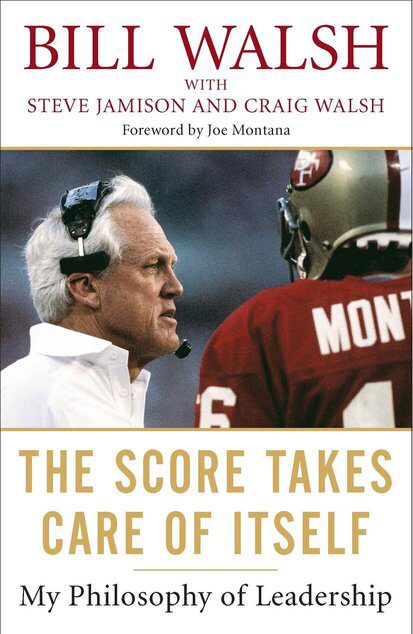Print | Kindle (eBook) | Audiobook
“Do all the right things to precision and “the score will take care of itself”
The Score Takes Care of Itself was recommended by Jack Dorsey at Y Combinator’s Startup School 2013, and John C. Maxwell says the book is one of his favorite books on Leadership.
Bill Walsh was an American football coach who served as the head coach of the San Francisco 49ers and the Stanford Cardinal. Walsh went 102–63–1 (wins-losses-ties) with the 49ers, winning 10 of his 14 postseason games along with six division titles, three NFC Championship titles, and three Super Bowls. He was named NFL Coach of the Year in 1981 and 1984. In 1993, he was elected to the Pro Football Hall of Fame.
“Most big things are simple in the specific, much less so in the general.”
The Score Takes Care of Itself is Bill’s very personal and, at times, painful account of the leadership lessons he learned during his life and his conclusions on how they might help you overcome your challenges as a leader. The book is based on Bill’s extensive conversations on his philosophy of leadership with best-selling author Steve Jamison.
Here are my favorite take-aways from reading, The Score Takes Care of Itself: My Philosophy of Leadership by Bill Wash.:
- Your effort in the beginning is part of a continuum of effort; your Standard of Performance is part of a continuum of standards. Today’s effort becomes tomorrow’s result. The quality of those efforts becomes the quality of your work. One day is connected to the following day and the following month to the succeeding years.
- Your own Standard of Performance becomes who and what you are. You and your organization achieve greatness.
A good leader is always learning. The great leaders start learning young and continue until their last breath.
Checklist (Bill’s astounding deductive-reasoning ability)
- Bill Walsh loved lists, viewed them as a road map to results.
- When confronted with a “problem”—for example, how do we score touchdowns without a good running game or a strong passer? what is our communication process on the sidelines during a game when crowd noise becomes overwhelming? what are the specific duties of my executive vice president for football operations? and hundreds and hundreds more—Bill Walsh dissected the issue into its relevant parts, found a solution, and then taught the solution to the appropriate individuals. His creative and commonsense brilliance as a problem solver was unsurpassed and a major component in the installation of what he called the Standard of Performance.
Failure is part of success, an integral part. Everybody gets knocked down. Knowing it will happen and what you must do when it does is the first step back
To Succeed You Must Fail
- Even when you have an organization brimming with talent, victory is not always under your control. Rather, it’s like quicksilver—fleeting and elusive, not something you can summon at will even under the best circumstances. Almosst always, your road to victory goes through a place called “failure.
There is no guarantee, no ultimate formula for success.
- A resolute and resourceful leader understands that there are a multitude of means to increase the probability of success. And that’s what it all comes down to, namely, intelligently and relentlessly seeking solutions that will increase your chance of prevailing in a competitive environment. When you do that, the score will take care of itself.
- Pursuing your ambitions, especially those of any magnitude, can be grueling and hazardous, and produce agonizing failure along the way, but achieving those goals is among life’s most gratifying and thrilling experiences. The ability to survive and overcome the former to attain the latter is a fundamental difference between winners and losers.
FIVE DOS FOR GETTING BACK INTO THE GAME:
1. Do expect defeat. It’s a given when the stakes are high and the competition is working ferociously to beat you. If you’re surprised when it happens, you’re dreaming; dreamers don’t last long.
2. Do force yourself to stop looking backward and dwelling on the professional “train wreck” you have just been in. It’s mental quicksand.
3. Do allow yourself appropriate recovery—grieving—time. You’ve been knocked senseless; give yourself a little time to recuperate. A keyword here is “little.” Don’t let it drag on.
4. Do tell yourself, “I am going to stand and fight again,” with the knowledge that often when things are at their worst you’re closer than you can imagine to success. Our Super Bowl victory arrived less than sixteen months after my “train wreck” in Miami.
5. Do begin planning for your next serious encounter. The smallest steps—plans—move you forward on the road to recovery. Focus on the fix.
Bill Wash DON’TS:
1. Don’t ask, “Why me?
2. Don’t expect sympathy.
3. Don’t bellyache.
4. Don’t keep accepting condolences.
5. Don’t blame others.
Bill Wash Standard of Performance: High Requirements for Actions and Attitudes
- An organization is not just a tool like a shovel, but an organic entity that has a code of conduct, a set of applied principles that go beyond a company mission statement that’s tacked on the wall and forgotten.
- Great teams in business, in sports, or elsewhere have a conscience. At its best, an organization—your team—bespeaks values and a way of doing things that emanate from a source; that source is you—the leader. Thus, the dictates of your personal beliefs should ultimately become characteristics of your team.
A philosophy is the aggregate of your attitudes toward fundamental matters and is derived from a process of consciously thinking about critical issues and developing rational reasons for holding one particular belief or position rather than another.
Bill Wash Standard of Performance—the values and beliefs within it—guided everything he did in his work at San Francisco and are defined as follows:
- Exhibit a ferocious and intelligently applied work ethic directed at continual improvement;
- Demonstrate respect for each person in the organization and the work he or she does;
- Deeply committed to learning and teaching, which means increasing my own expertise;
- Be fair; demonstrate character; honor the direct connection between details and improvement, and relentlessly seek the latter; show self-control, especially where it counts most—under pressure;
- Demonstrate and prize loyalty; use positive language and have a positive attitude; take pride in my effort as an entity separate from the result of that effort; be willing to go the extra distance for the organization; deal appropriately with victory and defeat, adulation and humiliation (don’t get crazy with success nor dysfunctional with loss);
- Promote internal communication that is both open and substantive (especially under stress);
- Seek poise in myself and those I lead; put the team’s welfare and priorities ahead of my own;
- Maintain an ongoing level of concentration and focus that is abnormally high, and make sacrifice and commitment the organization’s trademark.
On Hiring
- What Bill valued most highly when hiring: talent, character, functional intelligence (beyond basic intelligence, the ability to think on your feet, quickly and spontaneously), and an eagerness to adopt my way of doing things, my philosophy.
Team
- Leaders sometimes wonder why they or their organizations fail to achieve success, never seem to reach their potential. It’s often because they don’t understand or can’t instill the concept of what a team is all about at its best: connection and extension. This is a fundamental ingredient of ongoing organizational achievement. (Of course, incompetence as a leader is also a common cause of organizational failure.
- The leader’s job is to facilitate a battlefield-like sense of camaraderie among his or her personnel, an environment for people to find a way to bond together, to care about one another and the work they do, to feel the connection and extension so necessary for great results. Ultimately, it’s the strongest bond of all, even stronger than money.
In a way, an organization is like an automobile assembly line; it must be first-class or the cars that come off it will be second rate. The exceptional assembly line comes first, before the quality car.
Establishing Your Standard of Performance
In quantifying and implementing your own version of the Standard of Performance, the following guidelines are a good reference point:
1. Start with a comprehensive recognition of, reverence for, and identification of the specific actions and attitudes relevant to your team’s performance and production.
2. Be clarion clear in communicating your expectation of high effort and execution of your Standard of Performance. Like water, many decent individuals will seek lower ground if left to their own inclinations. In most cases you are the one who inspires and demands they go upward rather than settle for the comfort of doing what comes easily. Push them beyond their comfort zone; expect them to give extra effort.
3. Let all know that you expect them to possess the highest level of expertise in their area of responsibility.
4. Beyond standards and methodology, teach your beliefs, values, and philosophy. An organization is not an inanimate object. It is a living organism that you must nurture, guide, and strengthen.
5. Teach “connection and extension.” An organization filled with individuals who are “independent contractors” unattached to one another is a team with little interior cohesion and strength.
6. Make the expectations and metrics of competence that you demand in action and attitudes from personnel the new reality of your organization. You must provide the model for that new standard in your own actions and attitude.
Teaching Defines Your Leadership
- There are winners, and there are people who would like to be winners but just don’t know how to do it. Intelligent and talented people who are motivated can learn how to become winners if they have someone who will teach them.
- Leadership, at its best, is exactly that: teaching skills, attitudes, and goals (yes, goals are both defined and taught) to individuals who are part of your organization. Most things in life require good teaching—raising a family and educating children, running a company or sales team, or coaching athletes—so it’s unfortunate that more people don’t spend the time and thought required to do it effectively.
- The more you know, the higher you go.” To advance in any profession, I believe it is imperative to understand all aspects of that profession, not just one particular area: Only expertise makes you an expert.
- A teacher gains expertise by seeking out great teachers, mentors, and other sources of information and wisdom in a relentless effort to add to his or her own knowledge.
- In business this means actively seeking the counsel of those you respect in your profession, as well as studying printed material and publications that you determine will provide pertinent input.
Success Is Not Spelled G-E-N-I-U-S: Innovation, Planning, and Common Sense
1. Success doesn’t care which road you take to get to its doorstep. The traditionalists—rigid and resistant in their thinking—who sneered at the new passing system I was creating were soon trying to figure out why it was beating them and how to copy it.
2. Be bold. Remove fear of the unknown—that is, change—from your mind. Respect the past without clinging to it: “That’s the way we’ve always done it” is the mantra of a team setting itself up to lose to an organization that’s not doing it that way anymore.
3. Desperation should not drive innovation.
4. Be obsessive in looking for the upside in the downside.
Mystery to Mastery
- You never stop learning, perfecting, refining—molding your skills. You never stop depending on the fundamentals—sustaining, maintaining, and improving.
Criticism
- If you care about how you’re perceived by others, including the public, it’s good to remember the following: Criticism—both deserved and undeserved—is part of the territory when you’re the one calling the shots. Ignore the undeserved; learn from the deserved; lick your wounds and move on. Sometimes you can’t have the last word.
Mistakes
- “When you make a mistake, admit it and fix it. Don’t let pride, stubbornness, or possible embarrassment about your bad decision prevent you from correcting what you have done. Fix it, or the little problem becomes a big one.”
- “One of the common traits of outstanding performers—coaches, athletes, managers, sales representatives, executives, and others who face a daily up/down, win/lose accounting system—is that a rejection, that is, defeat, is quickly forgotten, replaced eagerly by pursuit of a new order, client, or opponent. They know that a defeat, whether a lost account or a loss on the field, can’t be taken personally.”
Moving Forward
- “If your hard work is coupled with intelligence and talent, you may win. If not, you go back to work and get ready for the next fight without feeling that somehow, having given it everything you’ve got (as I did for ten years), you are somehow inadequate as a person, that you didn’t measure up. You can’t let that happen to yourself.”
QUOTES
- “Creating gold from dross is alchemy; making lemonade when you’re given lemons is leadership; making lemonade when you don’t have any lemons is great leadership.”
- My ultimate job, and yours, is not to give an opinion. Everybody’s got an opinion. Leaders are paid to make a decision. The difference between offering an opinion and making a decision is the difference between working for the leader and being the leader
- While a healthy ego is crucial in leadership, it turns unhealthy when self-confidence becomes” arrogance, assertiveness becomes obstinacy, and self-assurance becomes reckless abandon. This is manifested when communication from leadership amounts to “Shut up and listen”—when your ego gets bigger than your ears.
- “A leader who just wants to hear “yes” is like a child who only wants to eat candy. Soon the youngster’s teeth are gone. Likewise, a leader who wants people standing in line to agree with him or her will soon be history, having sailed into the sunset as captain of the ship of fools.
- “Sometimes you snarl; sometimes you bite; sometimes you smile and give a thumbs-up. There’s a little bit of the actor in all good leaders”
- “Always there are mentors—some official, some unofficial. We apprentice when we are young, and it should continue even when we are old. A good leader is always learning. The great leaders start learning young and continue until their last breath.”
- “The “big plays” in business—or professional football—don’t just suddenly occur out of thin air. They result from very hard work and painstaking attention over the years to all of the details related to your leadership.”
- “Talent, functional intelligence, experience, maturity, effort, dedication, and practice may not be perfect, but they will get you so close to perfection that most people will think you achieved it. And the results will show it.”
- “It takes time to develop this Standard of Performance; it is not just a seminar or a practice or a season’s worth of seminars and practices, but thoughtful and intense attention over years and years. Then, when you’ve got to score on the last play of the game to win, you know it can happen. This is a powerful force to have within you.”
All the best in your quest to get better. Don’t Settle: Live with Passion.



2 Comments
Pingback: 100 Books Reading Challenge 2020 – Lanre Dahunsi
Pingback: On Leadership. – Lanre Dahunsi